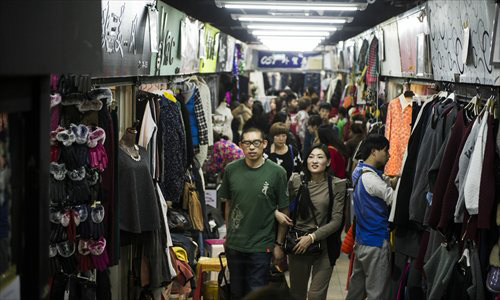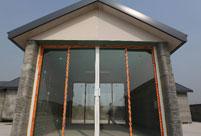 Let's dance in harmonic Shaanxi
Let's dance in harmonic Shaanxi
 Christie's to auction dazzling diamonds
Christie's to auction dazzling diamonds
 'Model husband' shatters image of love
'Model husband' shatters image of love
 Can animals smile? Or put on a happy face
Can animals smile? Or put on a happy face
 Geng Xuan crowned at 9th China Super Model Contest
Geng Xuan crowned at 9th China Super Model Contest
 Backstage at China Fashion Week
Backstage at China Fashion Week
 Ballerinas anywhere but onstage
Ballerinas anywhere but onstage
 Top 10 safest airlines in the world
Top 10 safest airlines in the world
 Posters of 33rd HK Film Awards unveiled
Posters of 33rd HK Film Awards unveiled
 Top 10 most popular instant messaging apps in the world
Top 10 most popular instant messaging apps in the world
 |
| Beijing's two largest clothing markets are leaving town, taking with them traffic congestion, but also jobs and a way of life. ( Li Hao/GT) |
Migrating south
On April 3, the Xicheng district government signed a contract with Langfang in Hebei Province on economic cooperation between the two regions, according to China National Radio. Yongqing in Langfang is one of the potential places to relocate the Zoo Market. The relocation will make way for a planned new hub of clothing boutiques, fashion showrooms and e-commerce.
A week later, the market was bustling as usual. Despite the government's announcement, most of the wholesalers have not yet received any official notice about the move.
When talking about the relocation, Yu becomes quite emotional. She shakes her head and says she does not believe the move can be implemented any time soon.
"It is such a giant project that it will take at least five years," she says. "Each of us has a large number of goods worth tens of thousands of yuan in storage."
Yu, a native Beijinger who has been running her business in the Zoo Market since 1995, has witnessed the expansion of the market starting from its beginning in the 1980s as street stands on the narrow lanes of the traditional old neighborhood.
"Clothing shops gathered here because the zoo was a popular place with lots of visitors," she recalls.
In 1995, Yu became a clothing wholesaler in one of the malls. At first she flew to Guangzhou in Guangdong Province to buy goods. "The flight ticket was only 880 yuan at the time."
In the 2000s, Yu launched her own brand, KaFa. She no longer wholesaled Guangdong goods, but had the clothes and bags produced at clothing factories in the suburbs or Hebei Province, according to designs she chose from the latest collections.
Yu moved her business several times, from a stall in the basement of the Jinkailide Mall, eventually ending up in Zhonghe Mall, where she believes shoppers are more willing to pay a higher price.
Nowadays, Yu sells hundreds of bags per day to retailers, and at least 70 or 80 bags to individual shoppers.
"Business is not as good as it was in the 1990s," she says, pinning this to more competition and the e-commence boom.
Crosstown rival also closing down
Wholesalers at the Dahongmen Clothing Market, located on the South Third Ring Road in Fengtai district, will be moved to Hebei Province.
According to Li Chaogang, Secretary of CPC Committee of Fengtai district, more than 20,000 wholesale shops are in 26 shopping malls in the Dahongmen area, employing over 130,000 people. The government plans to start its relocation this year, according to local newspaper the Beijing Times.
At around 4 pm on Saturday, wholesalers at the Dahongmen Clothing Wholesale Market are busy packing goods for the day's orders before the market closes at 5 pm.
"We have not received any notice to move, but rumors say that we are going to relocate to Gu'an in Hebei Province," says a seller surnamed Jin on the third floor of the Dahongmen Clothing Mall.
Like most of the wholesalers in Dahongmen, Jin says it will be impossible to move out of the market in such a short period. They believe a move will take at least three years after negotiations between the market managers and the government.
But Jin says the relocation would not have much affect on her business.
"Most of our customers are regular clients. If we move, they will follow us," says Jin.
According to figures from Fengtai district, more than 80 percent of the clothes in Dahongmen are sold to regions in Shanxi and Hebei provinces and the Inner Mongolia Autonomous Region. Less than 20 percent are sold in Beijing.
Moving toward the future
Wholesalers at the Zoo Market are not optimistic about their future. Staring in March, wholesalers at the Tianhaocheng Mall, on the north side of Xizhimenwai Dajie, began shutting down their businesses. After a month of discounts and sales, some of the stores were closed and some were empty.
A woman selling socks on the basement floor says that all the sellers received notice to move out one month before. "We were prepared for the move because all of our leases expired in April."
She says she has decided to quit the clothing business after the mall is closed. "We are the first to be asked to move, the next ones are the nearby malls," she said.
Yu also asserts that she won't move to Yongqing in Hebei. "It is too far. I would rather rent a stall in Guanyuan Market (in Chegongzhuang, Xicheng district). Today, the clothes business is hard and I probably won't do wholesale anymore," she says, appearing disappointed.
The relocation of the Zoo Market will help disperse more than 100,000 people to nearby cities from Beijing, which now is the home to 21 million people and around 5 million vehicles.
 3D-printed houses built in Shanghai
3D-printed houses built in Shanghai World largest scale of umbrella dance
World largest scale of umbrella dance Cherry blossoms reach peak bloom in Washington D.C.
Cherry blossoms reach peak bloom in Washington D.C. Red terraced fields in Dongchuan of Yunnan
Red terraced fields in Dongchuan of Yunnan Presentation ceremony of 33rd Hong Kong Film Awards
Presentation ceremony of 33rd Hong Kong Film Awards Cyber life of monks and nuns
Cyber life of monks and nuns Let's dance in harmonic Shaanxi
Let's dance in harmonic Shaanxi Jiaju Tibetan Village
Jiaju Tibetan Village Confucius institute at UC Davis
Confucius institute at UC Davis The backstage of the Fashion Week
The backstage of the Fashion Week College students in Han costumes
College students in Han costumes Postgraduate works as waitress
Postgraduate works as waitress Life in a Lahu village in Yunnan
Life in a Lahu village in Yunnan An orphan’s wedding
An orphan’s wedding Hollywood documentary brings Diaoyu Islands truth to new audience
Hollywood documentary brings Diaoyu Islands truth to new audienceDay|Week|Month